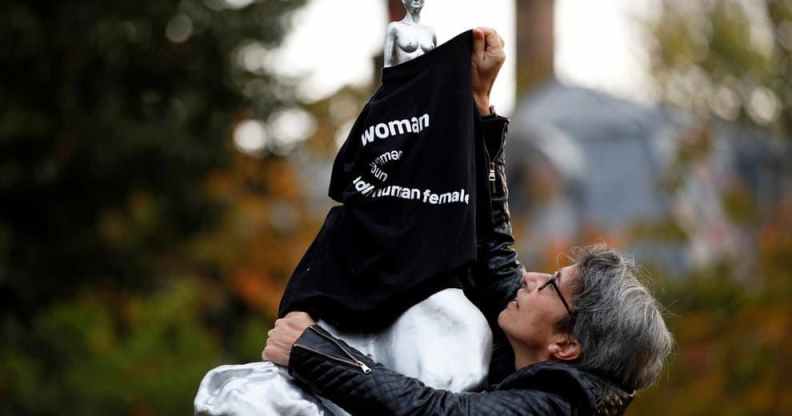So-called ‘gender-critical’ feminists are ‘peddling the far-right agenda’, warns Institute of Race Relations

‘Gender critical’ feminist Julia Long drapes an anti-trans “adult human female” t-shirt on the new Mary Wollstonecraft statue in London. (HazelTarragon/ Twitter)
Anti-racist think-tank the Institute of Race Relations has warned that anti-trans, or ‘gender-critical’, feminists in the UK are “peddling the far-right agenda”.
“The past few months have seen a backlash against trans rights in the UK, led by ‘gender-critical’ feminists who contend that sex is immutable and cannot be changed,” writes Sophia Siddiqui, deputy editor of the Institute of Race Relations (IRR) journal Race & Class.
“Those rallying around ‘sex based rights’ almost exclusively use this argument to justify the exclusion and separation of trans people from gendered spaces and from the wider feminist and LGBT movement.”
“Gender-critical” feminism – espoused by anti-trans groups like LGB Alliance, Women’s Declaration on Human Rights, Woman’s Place UK, Fair Play for Women, as well as multiple interconnected campaigners, academics and journalists – is defined by IRR as arising “from second wave feminism in the late 1970s and early 1980s, which understood feminism as a response to male power, which for them, is embodied by the male penis. Therefore, anyone who embodies maleness is considered a potential threat”.
Anti-trans groups in the UK oppose legal reforms that would strengthen trans rights, as well as trans women’s access to women’s spaces, trans-inclusive policies in workplaces, schools and public institutions, and a conversion-therapy ban that would protect trans kids from therapists seeking to make them cisgender. They have brought dozens of anti-trans legal cases and have broad, unquestioning support from the British media and government.
In the piece, titled “Feminism, biological fundamentalism and the attack on trans rights“, Siddiqui goes on to warn that “gender-critical” feminists are “[playing] into the hands of far-right street forces and extreme-right electoral parties which would like to abolish anti-discrimination protections altogether”.
She continues: “Time and time again, [“gender-critical” feminists] use the same biological arguments that a ‘man is a man, a woman is a woman’, to debase the rights of trans, intersex and non-binary people – often in the name of ‘women’s rights’.
“The rigid biological notion that ‘a man is a man, a woman is a woman’ is central to how the far right mobilises across Europe in order to enforce heterosexual norms.”
In British “gender-critical” feminism, one phrase that has come to embody this argument is the slogan – created by anti-trans campaigner Posie Parker – that a “woman = adult human female”.
Most recently, “gender-critical” feminist Dr Julia Long was photographed draping this on a new feminist statue in London. It’s also appeared on billboards, t-shirts and campaigns – symbolising the “gender-critical” claim that the only “real” women are those who were assigned female at birth.
The IRR piece continues: “Just as scientific racism centred on supposed biological differences to classify humans in a rigid racial hierarchy, ‘gender-critical’ feminists are propelling biological arguments that essentialise sex and its relation to gender identity, contending that sex is purely biological depending on what reproductive organs you have.
“Their arguments amount to a fundamentalist approach to biology, that labels anyone who doesn’t conform to a normative view of ‘womanhood’ or ‘manhood’ as abnormal, which ultimately increases the vulnerability of an already vulnerable group of people by segregating them as ‘other’.”
Are some feminists inadvertently peddling a far-right agenda?
As anti-trans culture wars gain momentum by the day, we must be attuned to how they can play into extreme- right agendas – with implications for all minorities.
🆕 @Race_Class bloghttps://t.co/PgqGqnFuoV
— Institute of Race Relations (@IRR_News) June 4, 2021
The IRR piece concludes: “The denial of solidarity between trans women and feminists, creating a false dichotomy between the two, detracts from issues that affect us all, such as rollbacks on reproductive rights, the epidemic of gender-based violence, attacks on LGBT rights and the entrenchment of nativist politics across Europe.
“Arguments that demarcate who is a ‘woman’ and who is deemed ‘other’ play directly into the far-right agenda, contributing to a right-wing moral panic and drawing lines around who is entitled to rights and who is not. We must resist this at all costs.”

